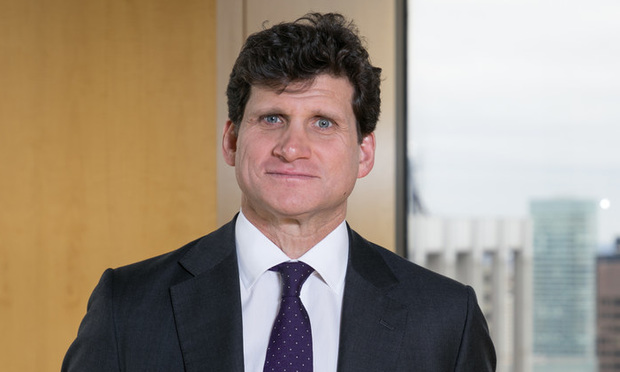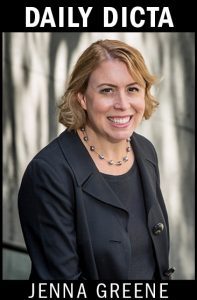For Willkie's Gordon Caplan, A Tragic Downfall in College Admissions Scandal
It's astonishing how parents who presumably just want to help their children can so totally lose sight of ethical boundaries.
March 13, 2019 at 11:40 AM
7 minute read
 Gordon Caplan. Photo: Carmen Natale.
Gordon Caplan. Photo: Carmen Natale.
My son turns 20 today. He's celebrating his birthday at U.C. Santa Cruz, where he's a sophomore. An introvert in high school, he is thriving academically, socially and artistically at college. I've never seen him so happy.
But Santa Cruz wasn't his first choice. Georgetown was.
He didn't get in, even though his SAT score was in the 99th percentile and his GPA was north of a 4.0.
We shrugged. We figured it was a crapshoot. But we never thought the system was rigged, that maybe the kid of some actor or law firm chairman got his spot because their parents bribed and cheated to get them in.
On Tuesday, federal prosecutors in Massachusetts brought criminal charges against 50 people in connection with a college admissions and testing bribery scheme. Desperate to get their children admitted to schools including Yale, Stanford, USC, Wake Forest and Georgetown, the parents allegedly shelled out tens or hundreds of thousands of dollars so their children could get higher SAT and ACT scores, or be falsely designated as athletic recruits.
 Among those charged with conspiracy to commit mail fraud and honest services mail fraud: actresses Felicity Huffman and Lori Loughlin and Willkie Farr & Gallagher co-chairman Gordon Caplan.
Among those charged with conspiracy to commit mail fraud and honest services mail fraud: actresses Felicity Huffman and Lori Loughlin and Willkie Farr & Gallagher co-chairman Gordon Caplan.
I'm not angry. My son is where he's meant to be. But I am disgusted and sad that parents who presumably just wanted to help their children would so totally lose sight of ethical boundaries.
At 204 pages, the affidavit in support of the criminal complaint is lengthy. But the section detailing the actions by Caplan, who made The American Lawyer's 2018 Dealmaker of the Year list, is particularly detailed—and devastating.
Caplan did not respond to a request for comment, nor did a firm spokesman.
The affidavit contains wiretap transcripts of several conversations allegedly recorded between Caplan and “Cooperating Witness 1”—presumably William Singer, who founded and operated The Edge College & Career Network, also known as “The Key,” based in Newport Beach, California. The witness, who has pleaded guilty to charges including racketeering and money laundering, agreed to cooperate in hopes of leniency when sentenced.
Caplan allegedly sought help raising his daughter's ACT score. The highest he said she'd gotten was a 22—about 63rd percentile—and he wanted it bumped to a 30 or 31—the 94th or 95th percentile. According to court papers, he was willing to pay $75,000 to do so.
Caplan allegedly agreed to a scheme. First, he and his daughter flew from New York to Los Angeles to meet with a psychologist that the witness knew in order to have her diagnosed with a learning disability. That way, she could get extra time to take the ACT.
The test makers—no one's fools—twice denied the daughter's request for accommodation, and only acceded after law enforcement as part of the sting asked them to allow it.
Caplan was rightfully wary. “I mean, it was like third time was the charm. So everybody was telling us there's no way, and then all of a sudden it comes in through [her school]. So, again, and—keep in mind I am a lawyer. So I'm sort of rules oriented. Doing this with you, no way…any trouble comes out of this, nothing like that?” he said, according to court papers.
The witness assured him he had done this many times before without problem.
After the testing accommodation was granted, Caplan and his daughter returned to Los Angeles to take the ACT at a school where the witness allegedly bribed test administrators to let him supply the proctor.
“[T]his is, again, how it all works,” the witness explained. “She'll take the test. It'll be all her taking the test and then at the end of the test, it would be decided that we want to score, let's say, 33.”
After she leaves, the proctor would review and correct her answers and “ensure that he makes it so that her score ends up being between a 32 and 34, just depending on the curve for that particular test day. And normally he's right on. And that is essentially how it would happen.”
The witness said the daughter would be none the wiser. “[S]he'll think she took it. She'll feel good about herself.”
Still, Caplan was wary. In a later conversation, he wondered whether the ACT would question “Why the hell is somebody living in Greenwich taking [the test] out in California?”
The witness had an easy answer: You'd say you were going to a bar mitzvah or a wedding or your daughter was playing in a tournament in LA that weekend. “Anything. But nobody ever asks.”
The closest Caplan in the transcripts came to expressing any ethical reservations was when the witness observed that many wealthy families “figured out that if I get my kid tested and they get extended time, they can do better on the test. So most of these kids don't even have [learning disability] issues, but they're getting time. The playing field is not fair.”
Caplan responded, “No, it's not. I mean this is, to be honest, it feels a little weird. But.”
“I know it does. I know it does,” the witness said. “But when she gets the score and we have choices, you're gonna be saying, 'Okay, I'll take all my kids, we're gonna do the same thing.'” (laughing)
Later, Caplan sounded unconcerned about the right or wrongness of his actions. “It's just, to be honest, I'm not worried about the moral issue here,” he said according to the transcript. “I'm worried about the, if she's caught doing that, you know, she's finished.”
The witness responded, “It's never happened before in twenty-some-odd years.”
Indeed, it appears Caplan's predominant concern was the possibility of getting caught.
At different points, he asked, “And has anybody ever gotten into an issue with this?” “Never been an issue?” “[Let me] ask you straight up. You've never had an issue with this? No one has ever gotten in trouble with this?” “And you are absolutely confident there is no issue here?”
He was right to worry.
It's hard to say what the consequences for him will be, but I suspect very bad. Prison? Getting disbarred? Fired from the firm? All of the above? He's 52 years old, in the prime of his career. It's a tragedy in the true literary sense, where a moral weakness causes ruin.
There will be a personal toll as well. How will his daughter feel that he tricked her? That he didn't believe she was good enough to succeed on her own?
As my own daughter prepares to take the SAT this spring, and to apply to colleges in the fall, I hope this case sends a message to any parents tempted to game the system: It's not worth it.
If there's one thing I believe as a mother, it's this: Your kids are not there to validate you. They are not extensions of your wishes or objects to brag about. Cheer their successes and mourn their failures, but recognize that they're individuals who must find their own way.
We hope you enjoyed this excerpt from Litigation Daily, the exclusive source for sharp commentary on mega court battles, winning strategies and the issues that obsess elite litigators. Click here to subscribe.
NOT FOR REPRINT
© 2025 ALM Global, LLC, All Rights Reserved. Request academic re-use from www.copyright.com. All other uses, submit a request to [email protected]. For more information visit Asset & Logo Licensing.
You Might Like
View All
Librarian's Termination Violated First Amendment Protections, Lawsuit Claims
3 minute read
Divided State Supreme Court Clears the Way for Child Sexual Abuse Cases Against Church, Schools

Longtime Purdue GC Accused of Drunken Driving Hires Big-Name Defense Attorney
3 minute read
LSU General Counsel Quits Amid Fracas Over First Amendment Rights of Law Professor
7 minute readTrending Stories
- 1Thursday Newspaper
- 2Public Notices/Calendars
- 3Judicial Ethics Opinion 24-117
- 4Rejuvenation of a Sharp Employer Non-Compete Tool: Delaware Supreme Court Reinvigorates the Employee Choice Doctrine
- 5Mastering Litigation in New York’s Commercial Division Part V, Leave It to the Experts: Expert Discovery in the New York Commercial Division
Who Got The Work
J. Brugh Lower of Gibbons has entered an appearance for industrial equipment supplier Devco Corporation in a pending trademark infringement lawsuit. The suit, accusing the defendant of selling knock-off Graco products, was filed Dec. 18 in New Jersey District Court by Rivkin Radler on behalf of Graco Inc. and Graco Minnesota. The case, assigned to U.S. District Judge Zahid N. Quraishi, is 3:24-cv-11294, Graco Inc. et al v. Devco Corporation.
Who Got The Work
Rebecca Maller-Stein and Kent A. Yalowitz of Arnold & Porter Kaye Scholer have entered their appearances for Hanaco Venture Capital and its executives, Lior Prosor and David Frankel, in a pending securities lawsuit. The action, filed on Dec. 24 in New York Southern District Court by Zell, Aron & Co. on behalf of Goldeneye Advisors, accuses the defendants of negligently and fraudulently managing the plaintiff's $1 million investment. The case, assigned to U.S. District Judge Vernon S. Broderick, is 1:24-cv-09918, Goldeneye Advisors, LLC v. Hanaco Venture Capital, Ltd. et al.
Who Got The Work
Attorneys from A&O Shearman has stepped in as defense counsel for Toronto-Dominion Bank and other defendants in a pending securities class action. The suit, filed Dec. 11 in New York Southern District Court by Bleichmar Fonti & Auld, accuses the defendants of concealing the bank's 'pervasive' deficiencies in regards to its compliance with the Bank Secrecy Act and the quality of its anti-money laundering controls. The case, assigned to U.S. District Judge Arun Subramanian, is 1:24-cv-09445, Gonzalez v. The Toronto-Dominion Bank et al.
Who Got The Work
Crown Castle International, a Pennsylvania company providing shared communications infrastructure, has turned to Luke D. Wolf of Gordon Rees Scully Mansukhani to fend off a pending breach-of-contract lawsuit. The court action, filed Nov. 25 in Michigan Eastern District Court by Hooper Hathaway PC on behalf of The Town Residences LLC, accuses Crown Castle of failing to transfer approximately $30,000 in utility payments from T-Mobile in breach of a roof-top lease and assignment agreement. The case, assigned to U.S. District Judge Susan K. Declercq, is 2:24-cv-13131, The Town Residences LLC v. T-Mobile US, Inc. et al.
Who Got The Work
Wilfred P. Coronato and Daniel M. Schwartz of McCarter & English have stepped in as defense counsel to Electrolux Home Products Inc. in a pending product liability lawsuit. The court action, filed Nov. 26 in New York Eastern District Court by Poulos Lopiccolo PC and Nagel Rice LLP on behalf of David Stern, alleges that the defendant's refrigerators’ drawers and shelving repeatedly break and fall apart within months after purchase. The case, assigned to U.S. District Judge Joan M. Azrack, is 2:24-cv-08204, Stern v. Electrolux Home Products, Inc.
Featured Firms
Law Offices of Gary Martin Hays & Associates, P.C.
(470) 294-1674
Law Offices of Mark E. Salomone
(857) 444-6468
Smith & Hassler
(713) 739-1250








